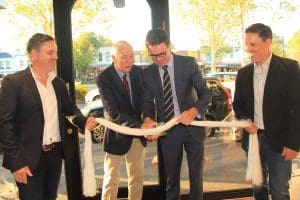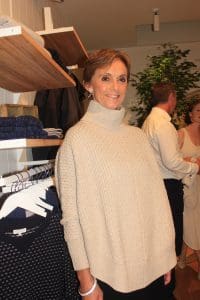
Toorallie co-managing director Simon Smith, left, and brother Steven, far right, flank chairman Peter Small and Minister for Agriculture David Littleproud at the flagship store opening.
WOOL growers, brokers, designers and Australia’s Minister for Agriculture gathered to celebrate a domestic wool marketing success story in Melbourne last week.
Federal Minister for Agriculture and Water Resources David Littleproud opened the refurbished Toorallie flagship store in Clifton Hill on March 8.
Mr Littleproud said the Toorallie was a great story of resilience and “also a great agricultural success story.”
“That’s the exciting thing, those that have persevered through the wool industry’s lows … but now what we are seeing is the renaissance of the wool industry, which is so exciting.
“The good thing is that it is telling our story to metropolitan Australia, because for far too long we haven’t been able to tell that story and because of that we haven’t got the right policy settings done, particularly around resource management.”
Mr Littleproud said it was important that the story of agriculture, regional and rural Australia be brought to metropolitan Australia.
“Because for so long, in decades past, many people in metropolitan Australia had a connection with those of us in regional Australia and the bush that produced the food and fibre for you, but that’s been lost.
“But now we need new story tellers; we need to bring our product and showcase that, not only to Melbourne but to the world; about how good we are,” he said.
“We are the very best in the world, we produce the very best in the world and we have the best people in the world producing it.”
Toorallie story grew out of reserve price scheme hardship
Quality Softwools Australia and Toorallie chairman, Victorian wool producer Peter Small said Toorallie’s story, which grew out of the collapse of the wool reserve price scheme, is a story of innovation inspired by hard times.
He said the Smith family at Bombala, with the collapse of the reserve price scheme, in a factory in the former Bombala theatre, successfully turned wool from their Merino sheep into the first Toorallie knitwear.
Mr Small said at the same time another group of growers led by Charles Massy with wool skin biologist Dr Jim Watts formed Quality Softwools to process elite wools into garments. QSA now owns the Toorallie brand.
“Today we have created something that is really quite unique and I believe we have a story that goes from the sheep through to the shop.”
The Toorallie story includes the sourcing of selected wool from the historic Pooginook Merino flock in New South Wales, selected to supply the brand after Mr Small’s long search to find Merino wool that would not pill and exhibited a unique sheen in finished garments. The wool is processed by Toorallie’s Chinese top maker New Chuwa and spinner Xinao.
Mr Small said without the enthusiasm of Xinao’s managing director Mr Zhou, Toorallie would not have been able to develop the Pooginook-Toorallie pipeline that supplies 250 retail stores throughout Australia.
If you grow it, you have to wear it

Pooginook representative Anthea Sutherland models a Toorallie garment.
Anthea Sutherland, wife of Pooginook manager John Sutherland, was at the store opening to sample garments from the autumn winter collection. She said it was “the ultimate to see your wool product on a hanger in this beautiful environment”.
“It’s a beautiful fibre and it is in beautiful garments and you can’t ask for anything else.”
Modelling some of the latest Toorallie designs, Anthea Sutherland said: “If you grow it, you have to wear it.”
“I have quite a number of pieces from last year, but I haven’t selected any for this year, but I’ve perused the catalogue, don’t you worry.”
Toorallie-Pooginook co-operation marks new chapter
Toorallie executive director Simon Smith said he and his brother and co-managing director Steve Smith, said the opening was a celebration of the co-operation with Pooginook, it’s owner Paraway Pastoral Company, Macquarie Bank, Toorallie designer Jo Nicholaou and Xinao.
“We’re not a massive customer for anyone because we are a niche brand, but having that co-operation and passion has allowed it to happen.
“The other thing is, Toorallie has been going for about 25 years, 13 in Melbourne and this is really the beginning of a new chapter with a re-branding honing in on the Pooginook provenance – this a bunkering down to fly on really.”
Mr Smith said the first release of garments with Pooginook provenance last year was well-received and had helped elevate overall Toorallie sales. He said Toorallie’s Pooginook-sourced range was being pitched as an example of “slow fashion” as against “the fast fashion of racing it around and shoving it on the shelf at trend-driven low prices.”
Leading Australian wool industry analyst Chris Wilcox said the Toorallie-Pooginook supply chain was a great partnership between raw Australian Merino wool and the Chinese processing know-how and labour costs, to develop quality products for domestic and global sale.
“It is a great partnership that has been going for over 20 years and that’s exactly why the wool industry is where it is now, with the very high prices.”
Mr Wilcox said Australia’s labour costs could not compete with those of China, but Australia could provide the raw material, the ideas and the designs.



HAVE YOUR SAY